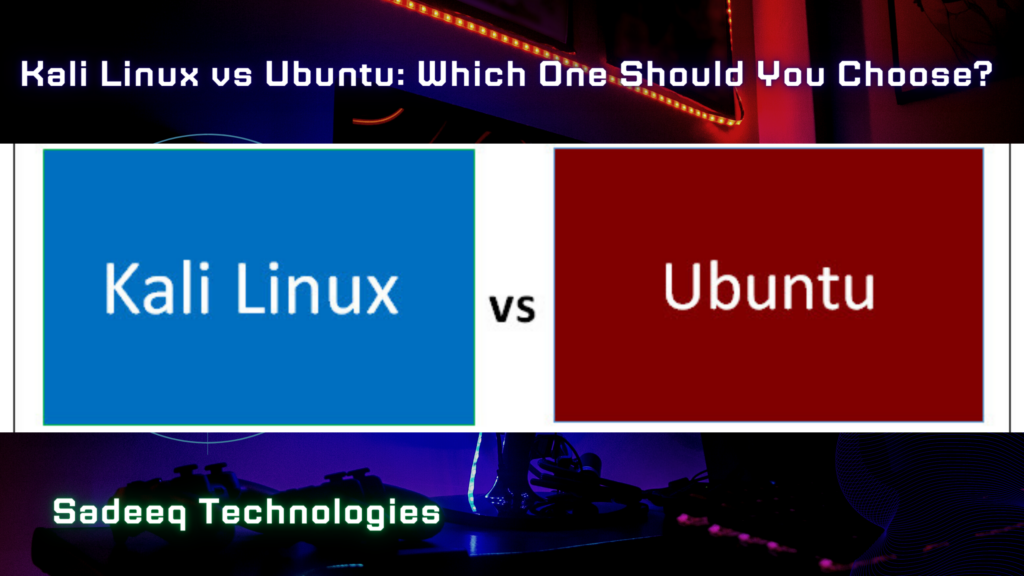If you are looking for a Linux distribution that can meet your needs for security, penetration testing, hacking, or general-purpose computing, you might have come across Kali Linux and Ubuntu. Both of them are popular and widely used operating systems, but they have different features, advantages, and disadvantages. In this blog post, we will compare Kali Linux vs Ubuntu: Which One Should You Choose?
You might also like Linux Commands A-Z
What is Kali Linux?
Kali Linux is a Debian-based Linux distribution that is designed for advanced security and penetration testing. It comes with over 600 pre-installed tools for various tasks such as network analysis, vulnerability scanning, password cracking, digital forensics, reverse engineering, and more. Kali Linux is also the official operating system of the Offensive Security Certified Professional (OSCP) certification, which is one of the most respected and sought-after credentials in the cybersecurity industry.
Kali Linux is not meant for beginners or casual users. It is a highly specialized and powerful system that requires a lot of technical knowledge and experience to use effectively. It is also not recommended to use Kali Linux as your main or daily operating system, as it may compromise your privacy and security. Kali Linux is best suited for professionals or enthusiasts who want to perform ethical hacking, security auditing, or research on various systems and networks.
What is Ubuntu?
Ubuntu is a Debian-based Linux distribution that is designed for general-purpose computing. It is one of the most popular and user-friendly operating systems in the world, with millions of users across different devices such as desktops, laptops, servers, cloud platforms, smartphones, tablets, and more. Ubuntu offers a sleek and intuitive graphical user interface (GUI), a large and active community of support and development, and a rich and diverse software repository.
Ubuntu is ideal for beginners or casual users who want to enjoy a smooth and hassle-free computing experience. It is also suitable for advanced users who want to customize their system or run various applications and services. Ubuntu is a versatile and reliable operating system that can handle most of your personal or professional needs.
Kali Linux vs Ubuntu Which One should you Choose: Comparison
Now that we have a basic understanding of what Kali Linux and Ubuntu are, let’s compare them based on some key criteria:
– Security: Kali Linux is more secure than Ubuntu by default, as it runs with minimal privileges and has various security features such as encryption, firewall, anti-virus, anti-malware, etc. However, this also means that Kali Linux is more restrictive and less convenient to use than Ubuntu. Ubuntu is less secure than Kali Linux by default, as it runs with more privileges and has fewer security features. However, this also means that Ubuntu is more flexible and easy to use than Kali Linux. You can also enhance the security of Ubuntu by installing additional tools or configuring your system settings.
– Performance: Kali Linux is more performance-oriented than Ubuntu, as it has a lighter and faster system that consumes less resources and boots quicker. However, this also means that Kali Linux has fewer graphical elements and less functionality than Ubuntu. Ubuntu is less performance-oriented than Kali Linux, as it has a heavier and slower system that consumes more resources and boots slower. However, this also means that Ubuntu has more graphical elements and more functionality than Kali Linux. You can also improve the performance of Ubuntu by removing unnecessary programs or tweaking your system settings.
– Compatibility: Kali Linux is less compatible than Ubuntu with various hardware devices and software applications. This is because Kali Linux has a smaller user base and a narrower focus than Ubuntu. You may encounter some issues or limitations when using Kali Linux on certain devices or with certain programs. Ubuntu is more compatible than Kali Linux with various hardware devices and software applications. This is because Ubuntu has a larger user base and a broader focus than Kali Linux. You can easily find drivers or support for most devices or programs when using Ubuntu.
– Updates: Kali Linux has more frequent updates than Ubuntu, as it follows a rolling release model that provides continuous updates to its system and tools. However, this also means that Kali Linux may be more unstable or buggy than Ubuntu at times. You need to be careful when updating your system or tools on Kali Linux to avoid breaking anything. Ubuntu has less frequent updates than Kali Linux, as it follows a fixed release model that provides major updates every six months and minor updates every month. However, this also means that Ubuntu may be more outdated or behind than Kali Linux at times. You need to wait for the next release cycle to get the latest features or fixes on Ubuntu.
– Support: Kali Linux has less support than Ubuntu from its developers and community. This is because Kali Linux has a smaller
Also Check Linux File System & Files
Conclusion
In conclusion, Kali Linux and Ubuntu are both excellent operating systems, but they serve different purposes. If you’re a security professional or a hacker, Kali Linux is the better choice for you. It comes with a wide range of tools for penetration testing and digital forensics, and it’s built with security in mind.
If you’re a general-purpose user who’s new to Linux, Ubuntu is the better choice for you. It’s easy to use, customizable, and supports a wide range of software. It’s also a secure OS, but it’s not specifically designed for security.
Ultimately, the choice between Kali Linux and Ubuntu depends on your needs
